What Do Health Care Jobs Pay in 2024? Salary + Career Guide

quick answer
The average health care worker makes $46.10/hour ($89,895 annually). Salaries vary by experience, from $52K to $148K. Assistant or Aide jobs tend to be on the lower end, while jobs that require more education, like Physical Therapist or Dental Hygienist, are typically on the higher end.
In This Article
Is health care a good career path? You may have asked yourself this question, among others, while contemplating potential job options.
In general, health care jobs pay well, with the average health care worker earning an average annual salary of $89,895. In addition to gainful employment, health care can be a rewarding career path for those passionate about helping others and offers a wide range of opportunities.
However, it also requires dedication, empathy, and a commitment to lifelong learning to navigate the challenges of the health care industry.
Here’s a complete guide to the pros and cons of a health care career, job requirements, salary ranges, and the top health care jobs to consider.
If you’re looking to find rewarding careers in health care without committing hundreds of thousands of dollars to student loans and debt, there are many options available. Many entry-level jobs in health care offer the perfect launch pad for a fulfilling, long-term career in the field.
Here are 16 fulfilling health care jobs — all of which you can begin in a matter of months. We’ll unpack each role’s core responsibilities, average salary, and required education so you can understand the path to start your career.
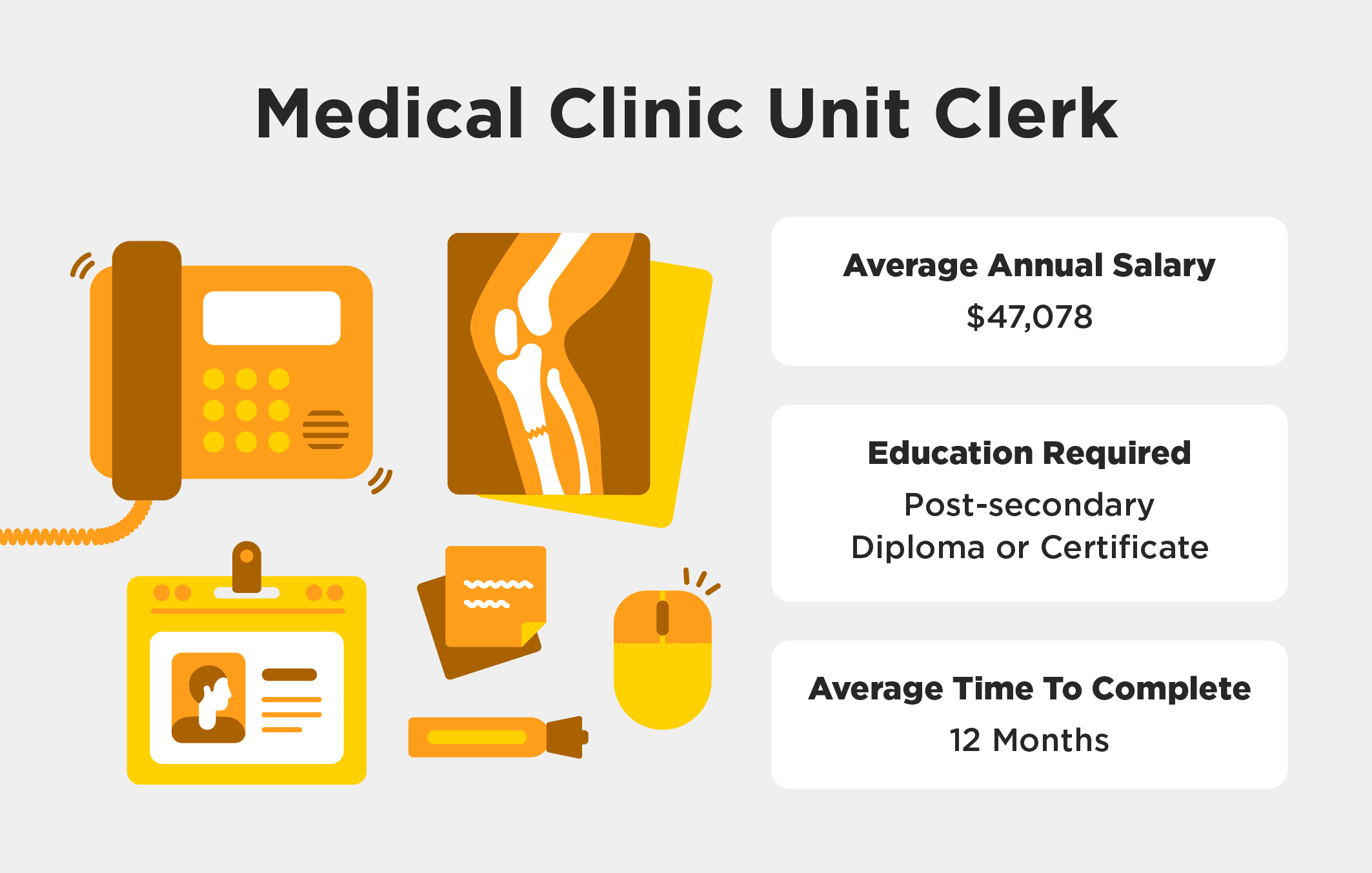
Average Annual Salary: $47,078
Education Required: Post-Secondary Diploma or Certificate
Average Time to Complete: 12 Months
Kicking off our list is Medical Clinic Unit Clerk, a health care professional who ensures the daily operations of a medical facility run smoothly. In this dynamic, entry-level role — a hybrid of administrative work and hands-on work with patients — you’re responsible for:
As an entry-level health care job, you’ll gain hands-on, foundational experience working in the medical field with little prior experience required. In some locations, a secondary school diploma or G.E.D. may be the minimum education required. In other areas, a certificate program or post-secondary diploma — which can take as little as one year to complete — is preferred. Regardless of whether it’s required in your area, securing your certification can give you a competitive advantage.
Average Annual Salary: $47,409
Education Required: Post-Secondary Diploma or Certificate
Average Time to Complete: 12 Months
As an entry-level health care job, a Medical Office Assistant is similar to a Medical Clinic Unit Clerk. Medical Office Assistants complete an array of administrative work in a medical setting, including:
The key difference between a Medical Office Assistant and a Medical Clinic Unit Clerk is that Medical Office Assistants complete administrative duties but may also assist with basic medical tasks like preparing exam rooms and taking patient vitals upon arrival.
Typically, a post-secondary diploma or certificate, which you can generally complete in one year, is required for the role.
Average Annual Salary: $48,531
Education Required: Secondary School Diploma (Required); Post-Secondary Diploma or Certificate (Preferred)
Average Time to Complete: 12 Months
Also known as a Health Care Assistant, a Nursing Assistant is responsible for the basic care of patients. Core responsibilities of this entry-level health care job include:
Becoming a Nursing Assistant can be an incredibly rewarding health care job that enables hands-on work with patients. While a secondary school diploma is typically the minimum education required for the role, a post-secondary diploma is often preferred by some medical facilities and can give candidates a competitive edge in a crowded field.
Average Annual Salary: $51,368
Education Required: Post-Secondary Diploma or Certificate
Average Time to Complete: 6 Months
Similar to a Nursing Assistant, a Health Care Aide supports nurses and doctors by providing hands-on patient support and care, including:
Health Care Aides are sought-after roles in both hospitals and long-term care facilities where patients might suffer from chronic illness. Essential skills Aides should have include strong interpersonal skills, excellent written and verbal communication skills, basic clerical skills, foundational knowledge of basic grooming, and knowledge of best practices in sanitizing medical equipment.
A post-secondary diploma or certificate is generally required for the role and can be completed in as little as six months.
Average Annual Salary: $52,266
Education Required: Post-Secondary Diploma or Certificate
Average Time to Complete: 1-3 Years
A Pharmacy Technician supports the work of a Pharmacist by completing much of the technical work required for the role. A Pharmacy Technician fulfills prescriptions for the Pharmacist to verify and approve. Additionally, Pharmacy Technician duties include counting pills, measuring liquids, mixing solutions, and inventory management. They are also responsible for:
Pharmacy Technician roles are in demand at hospitals or retail pharmacies, and the education and training required can vary by province or territory. For example, completion of a two- or three-year pharmaceutical program at the College of Pharmacists is required in British Columbia, Manitoba, Ontario, and Saskatchewan.
In Alberta, a diploma or certificate from a program recognized by the Alberta College of Pharmacy is required. Be sure to understand the individual needs and requirements of the province in which you intend to work before setting out to start your education or training. Pharmacy Technician salaries also vary by province.
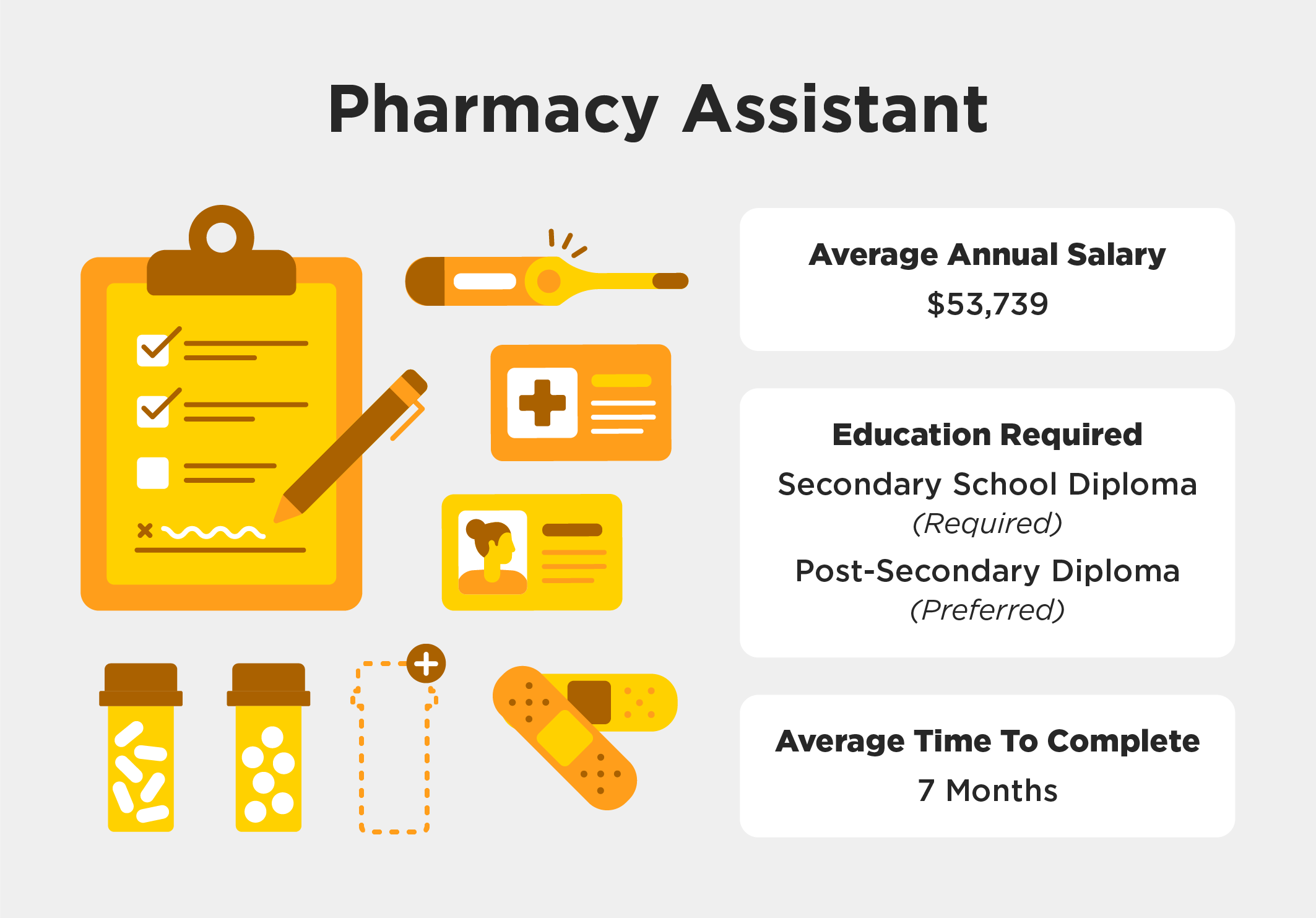
Average Annual Salary: $53,739
Education Required: Secondary School Diploma (Required); Post-Secondary Diploma or Certificate (Preferred)
Average Time to Complete: 7 Months
A Pharmacy Assistant is responsible for administrative duties such as customer service, data entry, and restocking supplies. The role is similar to the role of a Pharmacy Technician, but the primary difference between the two is that a Technician is focused on supporting the Pharmacist, whereas an Assistant is focused on supporting customers. Additionally, a Pharmacy Assistant is responsible for:
Pharmacy Assistant qualifications are unique to individual provinces and territories — and can further vary depending on whether you want to work in a hospital, retail pharmacy, or long-term care facility. In general, hospitals tend to require more advanced credentials, such as a post-secondary certificate or diploma program, which you can complete in just seven months.
Average Annual Salary: $57,142
Education Required: Post-Secondary Certification
Average Time to Complete: 6 Months or Less
What is a Phlebotomist, you may wonder? A Phlebotomist is a job in health care specifically trained to collect blood samples from patients for medical testing. The core responsibilities of a Phlebotomist include:
Phlebotomists are typically employed by blood donation centers, diagnostic labs, hospitals, private clinics, and other medical facilities. To become a Phlebotomist, candidates must complete a college or post-secondary program in Medical Laboratory Science. Additional licensing or certification from regulating authorities — such as the Canadian Society for Medical Laboratory Science — may also be a requirement in some provinces.
Average Annual Salary: $57,451
Education Required: Post-Secondary Diploma or Certificate
Average Time to Complete: 2 Years
A Physical Therapist Assistant (PTA) provides patient care under the direct supervision of a Physical Therapist (PT) by implementing treatment plans designed by a licensed PT. Additional responsibilities of a PTA include:
PTAs are commonly employed by hospitals, schools, long-term care facilities, and private clinics. Required training and certification generally includes a post-secondary diploma in related coursework, which can be completed in two years. An additional two years of practical training in the field is also generally required.

Average Annual Salary: $63,556
Education Required: University Degree or Post-Secondary Diploma
Average Time to Complete: 5 Years
Also known as a Nutritionist, Dietitians are specialized roles that consult with patients to understand their health goals. For example, imagine a patient was prescribed medication for a disease that causes adverse side effects. A Nutritionist can work with the patient to adjust their diet to help reduce the negative effects of the new medication. So what does a Dietitian do, exactly? Core responsibilities include:
Dietitians typically work in private clinics, hospitals, long-term care facilities, and consulting firms. To become a Dietitian, candidates must complete a university degree or post-secondary program accredited by the Partnership for Dietetic Education and Practice (PDEP). Additionally, they must complete practical training and secure their licensing through the provincial regulatory agency.
Average Annual Salary: $66,254
Education Required: College or Post-Secondary Paramedical Training Program
Average Time to Complete: 1-3 Years
The primary role of a Paramedic is to assess a medical emergency and provide urgent care to a patient before being transported to a hospital’s emergency room. Typically, Paramedic services are required in the event of a sudden illness or a significant, sustained injury. Core responsibilities of a Paramedic include:
Hospitals, private ambulance companies, government agencies, and other private care facilities typically employ Paramedics. To become a Paramedic, certification from a one-to three-year recognized training program is required, plus professional licensing, which is required across all provinces of Canada.
Average Annual Salary: $83,941
Education Required: Post-Secondary Diploma in Radiography or Radiological Technology
Average Time to Complete Training: 2-3 Years
The primary role of an X-Ray Technician is to operate a hospital or medical facility’s X-ray equipment and diagnostic imaging technology. Radiologists will then use that imaging to diagnose and treat a variety of conditions, injuries, and illnesses. In addition to X-ray technology, the X-Ray Technician is also responsible for operating:
Beyond the required post-secondary education in radiography, certified licensing from your province or territory’s regulatory body is also a job requirement.
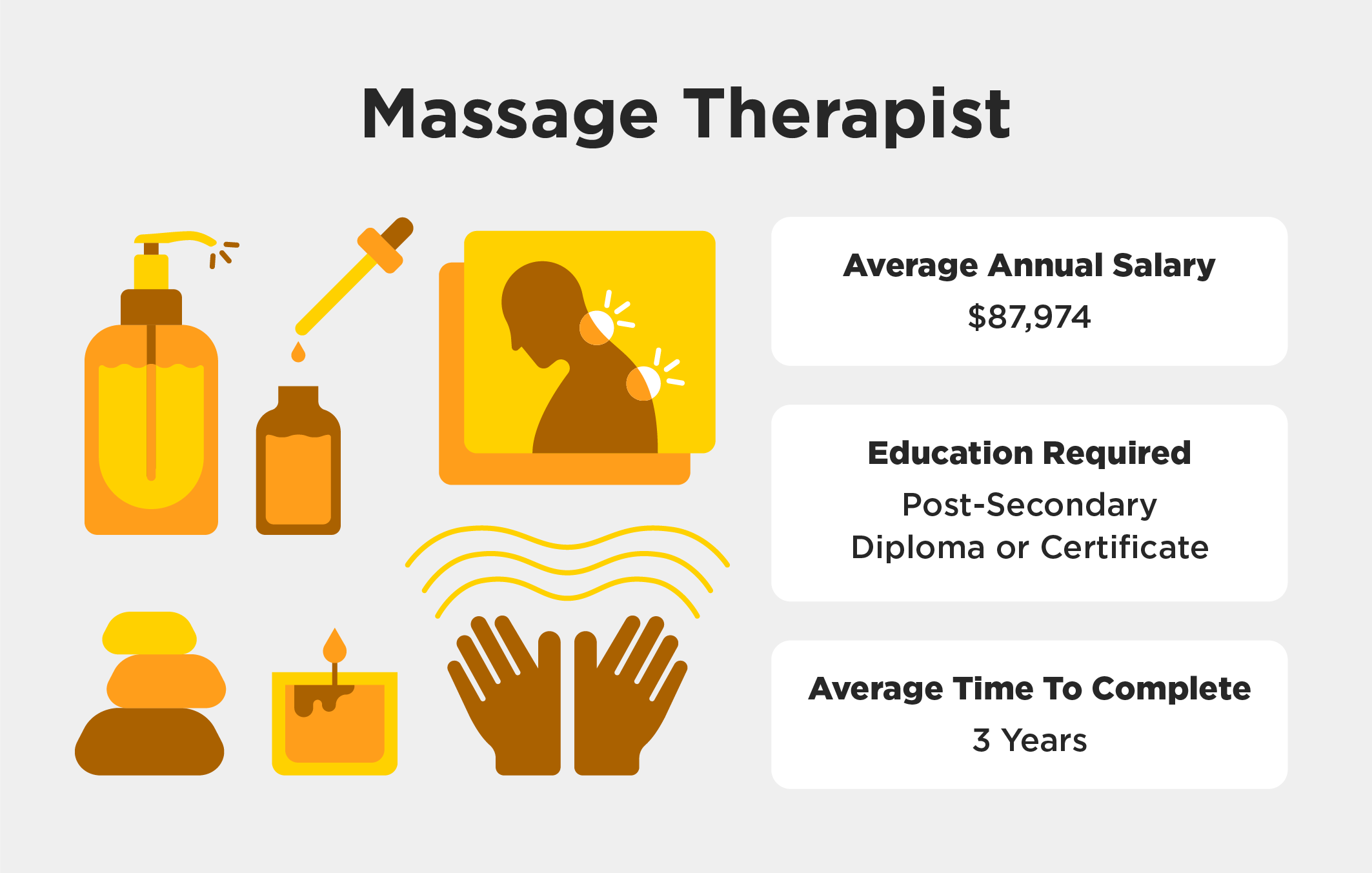
Average Annual Salary: $87,974
Education Required: Post-Secondary Diploma or Certificate
Average Time to Complete Training: 3 Years
With an increased focus on wellness in recent years, demand for massage therapy has grown as well. Massage therapy is often prescribed by doctors to help patients treat stress and ease physical tension. Massage Therapists are most often employed by private health clinics, long-term care facilities, and rehabilitation centers. Massage Therapists are responsible for:
In addition to completing an accredited program, massage therapy is also regulated in some provinces, including Newfoundland and Labrador, Ontario, and British Columbia, and further licensing issued by a regulatory body is required to practice in those locations.
Average Annual Salary: $88,760
Education Required: Post-Secondary Degree in Respiratory Therapy
Average Time to Complete Training: 3 Years
What does a Respiratory Therapist do? Respiratory Therapists work with patients experiencing breathing issues — both chronic and acute — to assess their condition and provide a customized treatment plan to help strengthen the patient’s airway.
A Respiratory Therapist’s core responsibilities include:
To become a Respiratory Therapist, a candidate must complete a post-secondary program specific to respiratory therapy, though some programs do require a Bachelor’s or even a Master’s Degree in the field. In addition, a period of clinical training in the field is further required, as is passing a written exam and securing a province-specific license before beginning work.
Average Annual Salary: $93,510
Education Required: Master’s Degree in Physiotherapy
Average Time to Complete Training: 2-3 Years
Also referred to as a Physiotherapist, a Physical Therapist (PT) is responsible for working with patients to improve their mobility as a result of an injury, illness, or natural course of aging. Additionally, a PT’s core responsibilities include:
To become a Physical Therapist, you must:
Average Annual Salary: $99,242
Education Required: Post-Secondary Diploma in Dental Hygiene
Average Time to Complete Training: 2 Years
A Dental Hygienist is responsible for cleaning a patient’s teeth to help prevent cavities and assessing a patient’s mouth for latent oral health issues. Additional responsibilities include:
In addition to completing a college, university, or post-secondary training program, Dental Hygienists must also pass the National Dental Hygiene Certification Exam and secure licensing from the regulatory body of the province in which they intend to work.
Average Annual Salary: $112,245
Education Required: Degree in Midwifery or Equivalent Program
Average Time to Complete Training: 3-4 Years
A Midwife is a medical professional trained to care for pregnant women from the early weeks after conception to six weeks postpartum. A Midwife’s primary responsibilities are:
To become a Midwife, you must complete a university degree in midwifery or a related post-secondary program. Additionally, a period of hands-on, practical training in the field is required. As a regulated field, the final step to practice as a Midwife is to secure your licensing, which varies by province or territory.
Entry-level jobs in health care can offer valuable, hands-on experience without requiring extensive education, training, or prior experience. If you’re looking to get a start in the health care industry, many jobs require minimal to no experience.
Here’s how to start or switch careers to get a job in health care with no experience:
Embarking on a career in health care presents a myriad of opportunities and challenges. From the impact you can have on people’s lives to the variety and learning opportunities available, health care can be a rewarding journey.
But like any path, it comes with its own set of challenges as well. Beyond what health care jobs pay, here’s an overview of the pros and cons you might encounter entering this dynamic field.
Many factors make a career in health care worth it, like:
On the other hand, health care isn’t without its challenges. While every health care career path or medical setting will be different, here are some general difficulties you may encounter in the field:
The job outlook for health care in Canada is robust, with the sector standing as the second-largest employer in the Canadian economy. Since the onset of the COVID-19 pandemic, the demand for health care professionals has more than doubled. With a shortage of health care workers and an increasing aging population, health care employment in Canada is expected to remain strong in the coming years.
So what do health care jobs pay? Health care jobs that require no experience include anything from administrative roles to hands-on positions working with patients. Annual salaries for these roles can vary dramatically depending on province or territory, and you should expect higher-paying roles to require more advanced degrees.
The average health care worker in Canada earns $46.10 per hour or $89,895 annually. Naturally, compensation varies dramatically depending on whether the job is an entry-level position or a more experienced mid- to senior-level role, ranging from $52,156 on the low end to $148,794 on the high end. It’s important to note that annual salaries or hourly wages for entry-level health care jobs may also differ by province or territory.
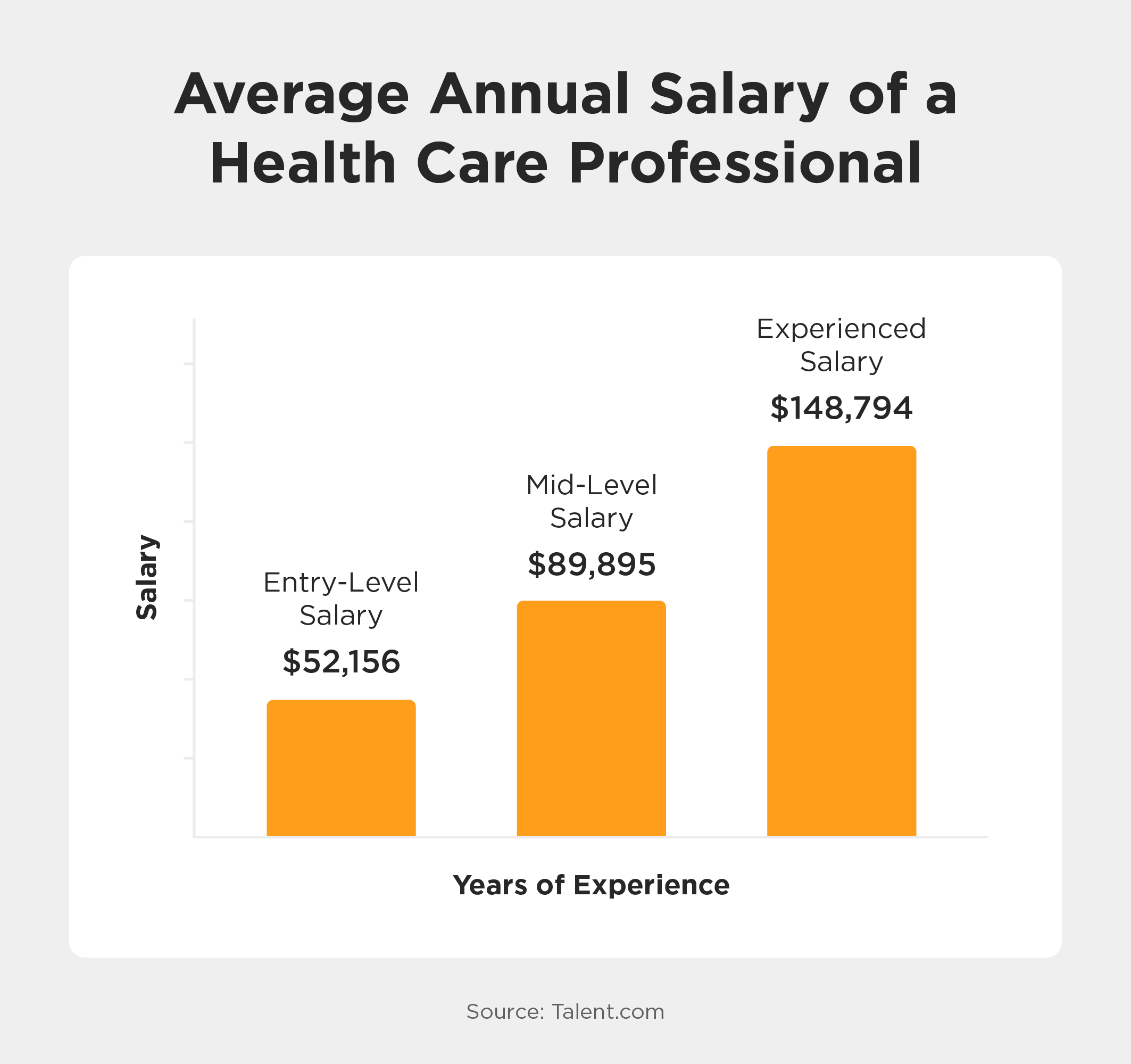
From degrees to specialized training programs, understanding the educational pathways and experience requirements of health care jobs is essential for aspiring professionals. Depending on what career path you take, the requirements may differ from entry-level to advanced degrees and training.
Education requirements will vary depending on the specific health care job you pursue. While health care careers are often associated with lengthy educational paths, plenty of health care jobs require only a post-secondary diploma or certificate that can be obtained in a year or two.
Beyond educational programs, some health care positions may require additional experience. This could include:
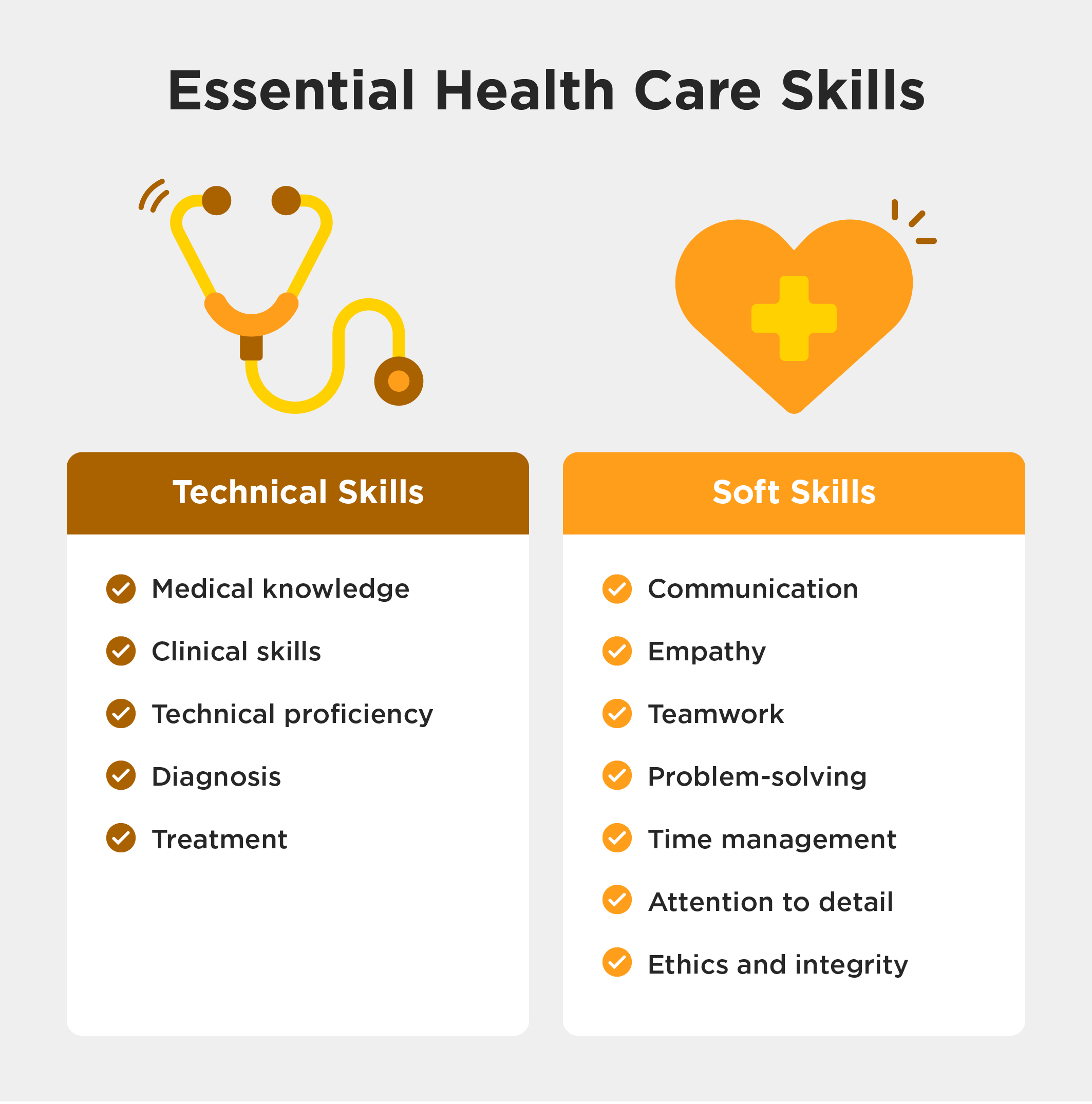
The specific skills required will depend on the health care path you choose, but here are some general hard and soft skills you may need to be successful in the field.
Technical skills:
Soft skills:
The best health career will depend on your interests, skills, and goals. The best health career for someone aligns with their passion, offers opportunities for personal and professional growth, and allows them to make a meaningful impact on others’ lives.
The highest paying jobs in health care include roles as a Family Physician (median salary: $250,000) or an Orthopaedic Surgeon (median salary: $335,000). Those careers, however, require an average of eight years of education, followed by an additional five years of medical residency — a massive commitment of time and money.
The hardest health care job is subjective and can vary depending on personal weaknesses, preferences, and workplace environment. However, roles like Emergency Room Physicians, Critical Care Nurses, or Surgeons often face high-stress situations, long hours, and intense pressure, making them challenging occupations in the heath care field.
So, is health care a good career path? While there’s no one-size-fits-all answer, the health care field offers a variety of fulfilling opportunities for those passionate about making a difference in people’s lives.
If you’re considering a career in health care, keep in mind that a post-secondary diploma or certificate can open a lot of doors without the intense job or education requirements typically associated with health care jobs.
Ready to start one of the many rewarding careers in health care? Explore our in-demand School of Health programs now.
In This Article
Once you take the first step, one of our Student Admissions Advisors will get in touch to better understand your goals for the future.
Apply Now